In this article, we discuss the different types of herbal teas!
When you want to unwind after a long day or enjoy a soothing beverage, herbal teas are a wonderful choice. These comforting brews offer a delectable way to stay hydrated and provide numerous health benefits ranging from stress relief to digestion support. With countless varieties sourced from plants worldwide, there’s an herbal tea for every taste and occasion.
Let’s dive into the captivating world of herbal teas and find the perfect cup to soothe your soul and nourish your body.
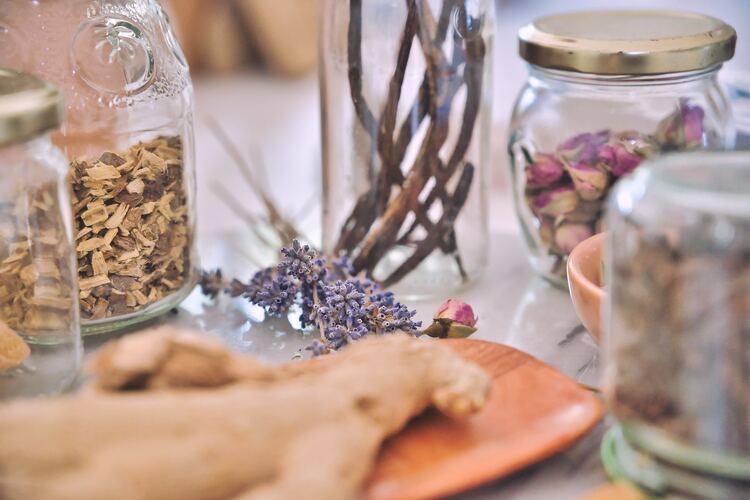
What are Herbal Teas?
Herbal teas, often referred to as “tisanes,” differ from traditional or true teas derived from the Camellia sinensis plant. Unlike tea from Camellia sinensis, which includes varieties like green, black, and oolong teas, herbal teas are made from an array of other plants. These plants can consist of anything from flowers and fruits to herbs and roots.
When you enjoy a cup of herbal tea, you’re sipping on a plant-infused beverage brewed for a certain amount, usually a few minutes. Making herbal tea typically involves boiling water and steeping the selected plants. This releases the plants’ flavor, aroma, and beneficial components into your drink.
Each herbal tea offers unique flavors and potential health benefits, and there’s truly something for everyone.
Below, we are highlighting the most sought-after types of herbal teas. In addition, I want to mention we have covered the herbal tea topic in depth on this site. Therefore, I will leave links pointing to all our articles (which include teas made with lesser-known ingredients).
Common Types of Herbal Teas
Herbal teas are made from various plant parts, such as flowers, roots, fruits, or spices. In this section, you’ll discover some of the most popular herbal teas and their unique benefits.
Chamomile Tea
Chamomile tea, made from the dried flowers of the chamomile plant, is known for its calming effects. This tea is an excellent choice for relaxation or to help with sleep issues. Additionally, it may help ease stomach discomfort and support digestion.
Ginger Tea
Ginger tea is made from the roots of the ginger plant. Not only is ginger tea known for its bold and spicy flavor, but it offers several health benefits, too. It can help soothe nausea, improve digestion, and even help reduce inflammation in your body.
Peppermint Tea
Made from the leaves of the peppermint plant, this tea is famous for its refreshing flavor and scent. Peppermint tea can help ease digestion, reduce bloating, and relieve headaches. It is an excellent option for those looking to avoid caffeine.
Hibiscus Tea
Hibiscus tea is made from the dried flowers of the hibiscus plant. It’s a vibrant, tart tea known for its deep red color. Hibiscus tea (known in Spanish as agua de jamaica) may offer benefits such as lowered blood pressure, improved digestion, and a boost in immune function due to its high vitamin C content.
Echinacea Tea
Echinacea tea is made from the echinacea plant’s roots, leaves, and flowers. It’s well-known for its potential to support your immune system. Some people use echinacea tea to help lessen the severity of colds and flu.
Rooibos Tea
Rooibos tea, a South African tea made from the leaves of the rooibos plant, is caffeine-free and has a naturally sweet, nutty flavor. This tea is packed with antioxidants, which can help protect your body from free radicals and support your overall health.
Lemon Balm Tea
Lemon balm tea is made from the leaves of the lemon balm plant. This delicious tea has a mild, citrusy flavor and is known for its calming effects on the nervous system. It may help reduce anxiety, promote relaxation, and improve sleep quality.
Rosehip Tea
Rosehip tea is made from the fruits of rose plants (I bet you didn’t know roses bear fruit). It has a tangy flavor and is packed with vitamin C and antioxidants. Rosehip tea can help support your immune system, promote healthy skin, and even assist with digestion.
Jasmine Tea
Jasmine tea is typically made by infusing green or white tea leaves with jasmine flowers. It has a delicate, floral flavor, and may provide some of the same health benefits as other green teas, such as improved heart health and weight management.
Turmeric Tea
Turmeric tea is made from the roots of the turmeric plant, which is a warm, earthy spice. This tea is known for its anti-inflammatory properties and may help ease joint pain, reduce inflammation, and promote overall well-being.
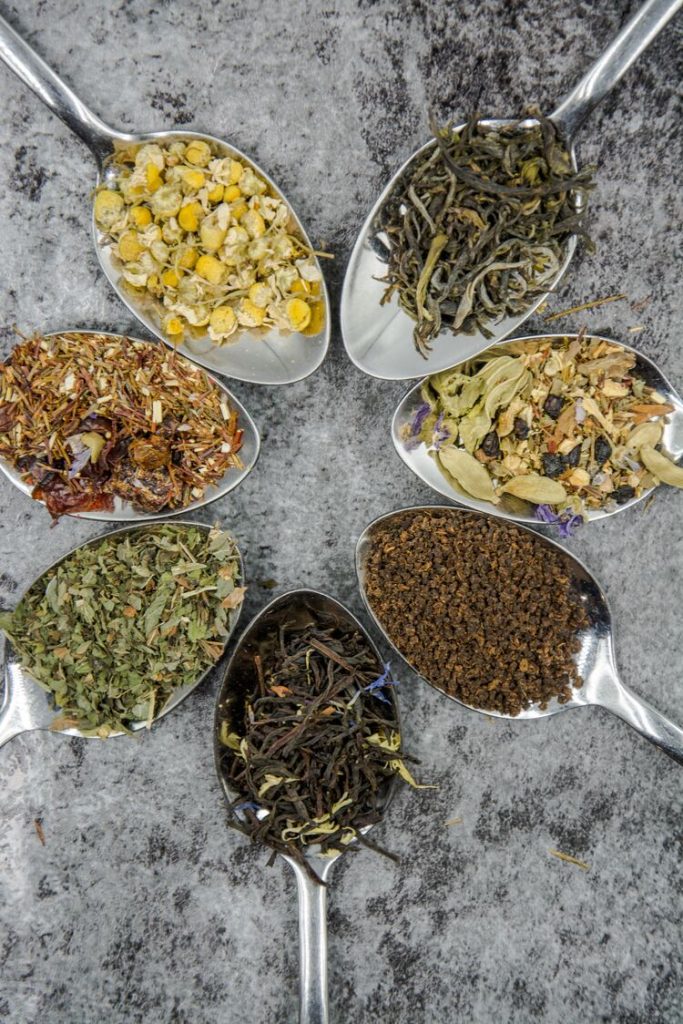
Other Types of Herbal Teas
It is impossible to quantify the number of herbal teas and blends. Below, you will find a sizable list of the types of herbal teas we have covered on this site. Each article details how to blend each specific ingredient with others.
Apple Flower, Avocado Leaves, Bamboo Leaf, Blueberry Pea, Blue Mallow, Chrysanthemum, Dandelion Root, Elderflower Tea, Ginseng, Honeybush, Juniper Berry, Kumquat, Lavender, Licorice Root, Mamaki, Mugwort, Mullein, Orange Peel, Osmanthus, Pine Needle, Pomegranate Flower, Raspberry Leaf, Red Clover, Rose, Sage, Tienchi Flower, Yerba Mate
Type of Herbal Teas: Ingredients and Flavors
Herbal teas can be made from leaves, herbs, roots, flowers, seeds, bark, spices, fruits, and even scents. These different components bring a delightful mix of tastes and aromas to your cup.
The leaves of plants such as mint, nettle, and lemon balm make for refreshing herbal teas. They tend to have a cooling effect (since they numb taste buds for a short time) that can be soothing and invigorating at the same time. In addition, various herbs like chamomile, lavender, and rosemary offer calming, floral aromas that help you unwind after a long day.
Roots are another popular component of herbal teas. Ingredients like ginger and licorice add a warm, earthy flavor that’s great for combating cold weather or an upset stomach. Meanwhile, using flowers like hibiscus, jasmine, and elderflower lends your tea a pleasant, fragrant touch.
Seeds and bark provide an exciting contrast in herbal tea blends. Seeds like fennel and anise bring natural sweetness and a touch of spice, while the bark from cinnamon, for example, imparts a warming, spicy essence. You can also experiment with blending these ingredients to create a custom flavor palate.
Moving on to spices, favorites like cardamom, cloves, and star anise contribute a bold kick to your tea. Pairing them with fruits like dried apple, orange peel, or berries will result in a delightful balance of sweet and savory flavors, perfect for any occasion.
Finally, don’t forget to consider the added dimensions that scents can bring to your tea experience. Ingredients like lemongrass or rose petals can enhance the overall aroma, making each sip an enjoyable sensory treat.
As you can see, the possibilities are endless when crafting your unique herbal tea experience.
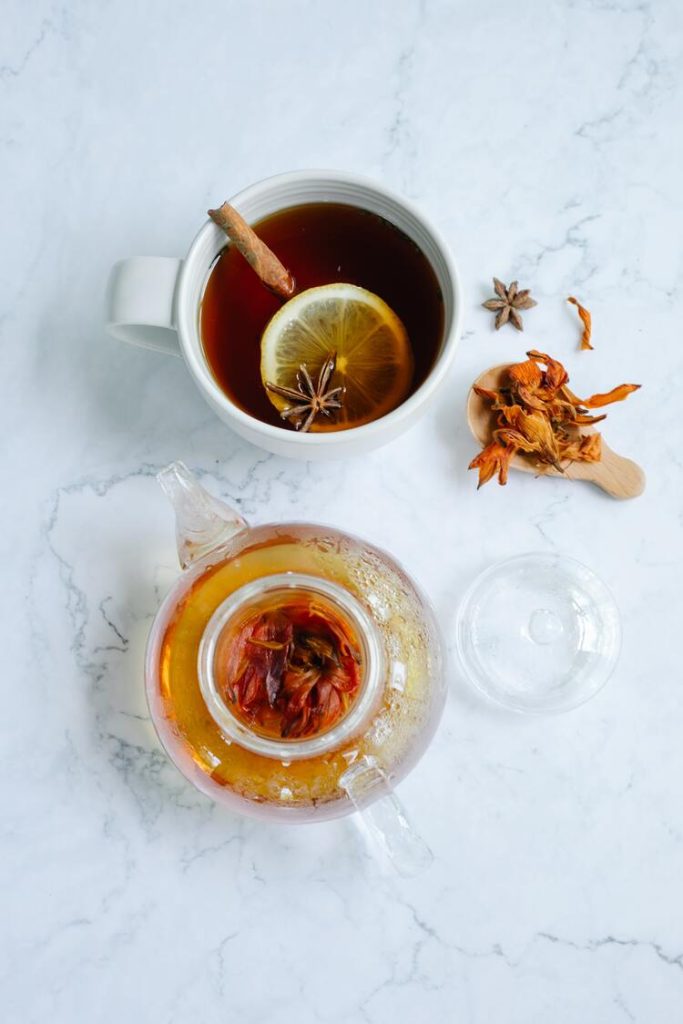
Health Benefits of Herbal Teas
Herbal teas offer a variety of health benefits that can improve your overall well-being. In this section, we will explore how herbal teas can contribute to a healthier lifestyle.
- Anti-Inflammatory Properties: Herbal teas, such as chamomile and ginger, have natural anti-inflammatory properties. These can help reduce inflammation and alleviate symptoms of conditions like arthritis and irritable bowel syndrome.
- Antioxidant Benefits: Herbal teas are rich in antioxidants, which help protect your cells from damage caused by free radicals.
- Digestive Aid: Many herbal teas can relieve digestive issues like bloating, gas, and upset stomach. Peppermint and ginger teas are among the most popular choices for easing digestion and keeping your gut healthy.
- Stress Relief and Anxiety Reduction: Sipping on a cup of herbal tea can aid in reducing stress and anxiety. Teas like chamomile, lavender, and lemon balm have calming effects on the body and mind, helping you to unwind and relax during stressful times.
- Immune System Support: Certain herbal teas, such as elderberry and echinacea, can help support your immune system, keeping you healthy and better prepared to fight illnesses.
- Blood Pressure and Heart Health: Herbal teas like hibiscus have been linked to lower blood pressure and improved heart health. They can help reduce cholesterol levels, decreasing the risk of heart disease.
- Sleep and Relaxation: Certain herbal teas have relaxing properties that can help improve your sleep quality. Teas like chamomile, valerian root, and passionflower can assist in calming your mind and promoting restful sleep.
Caffeine Content in Herbal Teas
While there are some exceptions, most herbal teas are naturally caffeine-free.
Now, pay attention to blends with true teas or true teas infused with herbal ingredients such as jasmine and osmanthus. These may contain caffeine. I recommend always reading the label/package if you are sensitive to caffeine effects.
And, remember, I mentioned there are exceptions. Well, here are a few examples of herbal teas that contain caffeine:
- Yerba Mate Tea: Yerba mate is a South American plant with a moderate amount of caffeine known for its stimulating effects.
- Guayusa Tea: Guayusa is an Amazonian plant that produces leaves used to make a tea with a caffeine content similar to yerba mate. Guayusa tea is often consumed for its energizing properties.
- Yaupon Tea: Yaupon is a holly plant native to the southeastern United States. Its leaves can make a caffeinated herbal tea, similar to traditional tea. Yaupon tea contains a small amount of caffeine.
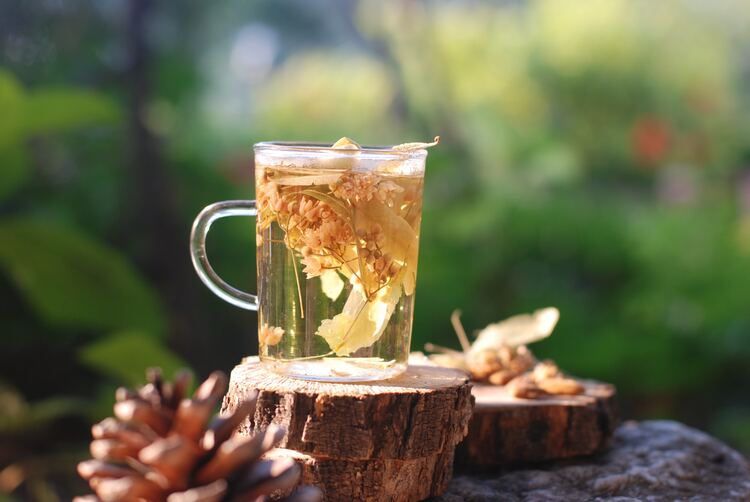
Cautions and Considerations
Consulting with a Doctor Before Use
It’s always a good idea to consult with your doctor before incorporating any new supplements or treatments into your healthcare routine. To help ensure the herbal teas you’re considering are safe and appropriate for your specific health condition, provide your physician with any relevant information, such as the exact blend and ingredients of the tea you wish to try.
Your doctor can then guide you in choosing the best options for your needs, taking into account any possible complications or interactions with your current medications.
Pregnancy and Herbal Teas
While herbal teas can be a comforting and healthy beverage for many people, it’s essential to be cautious during pregnancy. Some herbal teas can contain ingredients that might not be safe for pregnant women, such as chamomile and raspberry leaf. It’s always a good idea to consult with your doctor before consuming any herbal teas during your pregnancy.
Possible Side Effects and Interactions
Just like any other supplement or treatment, herbal teas can have potential side effects or interact with other medications you might be taking. Be aware of possible interactions, such as blood thinning effects from chamomile tea, especially if you’re scheduled for surgery or taking anticoagulant drugs. Staying informed about the properties of various herbal teas will help you decide which teas are suitable for your health.
How to Select and Store Herbal Teas
When you’re looking to select a herbal tea, here are a few things to keep in mind:
- Ingredients: Choose teas with high-quality, natural ingredients. Look for whole leaves, fruits, and herbs in the blend. Avoid teas with artificial flavorings, as they can affect the tea’s taste and potential benefits. When an option, select brands that offer organic products.
- Flavors: Herbal teas come in a wide range of flavors. Taste is subjective, so explore different options to find your preferred flavors. Many popular herbal teas combine herbs, fruits, and spices to create flavors appealing to a wide audience.
- Compounds: Certain compounds in herbal teas can offer health benefits. For example, antioxidants found in many teas may have anti-inflammatory and immune-boosting properties. Consider your personal needs and research which tea blends include the specific compounds you’re interested in.
To store your herbal teas properly, follow these tips:
- Keep them airtight: Exposure to air can affect the flavor and freshness of your tea. Store herbal teas with tight-fitting lids in airtight containers, such as tins or jars.
- Store in a cool, dark place: Direct sunlight and heat can degrade your tea’s flavor and potency. Keep your teas in a cool, dark spot like a pantry or cupboard.
- Avoid storing near strong odors: Herbal teas can absorb odors from their surroundings, so avoid storing them near strong-smelling items like spices or cleaning products.
- Check the expiration date: Although herbal teas can last for a long time, their flavorful compounds may lose potency over time. Note the expiration date, and enjoy your teas before they lose their vibrancy.
By considering these aspects and taking proper care of your herbal teas, you’ll be able to enjoy their delicious flavors and potential benefits to the fullest.
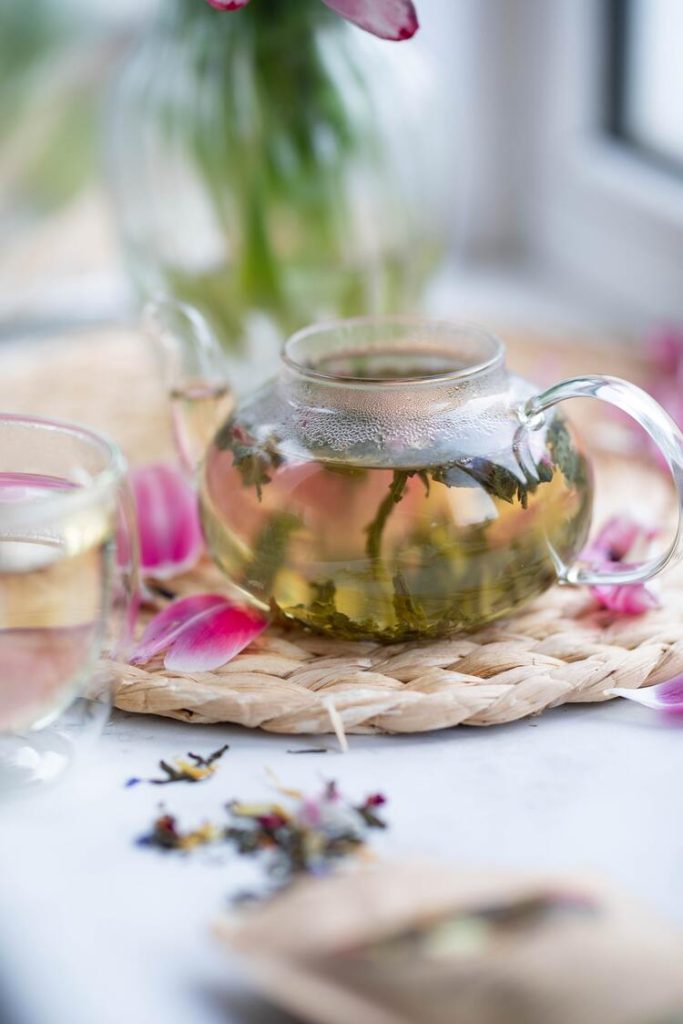
Frequently Asked Questions
What are the benefits of different types of herbal teas?
Herbal teas offer a variety of benefits depending on the ingredients. Some common benefits include aiding digestion (like peppermint and chamomile tea), boosting the immune system (such as echinacea tea), and promoting relaxation (valerian root and lavender teas).
Which herbal teas are caffeine-free?
Most herbal teas are naturally caffeine-free because they are made from plants that don’t contain caffeine. Examples of caffeine-free herbal teas include chamomile, rooibos, and peppermint. However, always check the label for any added caffeine or other stimulants.
How do herbal teas compare to green tea in terms of health?
Green tea is known for its antioxidant properties and potential benefits on metabolism, heart health, and weight loss. Herbal teas, like green tea, can offer similar health benefits but at varying levels, depending on the specific ingredients used. However, herbal teas are often caffeine-free, making them a good alternative for reducing caffeine intake.
What are some popular herbal tea recipes?
Preparing herbal tea is easy and can be personalized to your taste. Some popular herbal tea combinations include:
- Chamomile and lavender for relaxation
- Ginger and lemon for digestion
- Rooibos and rose petals for a naturally sweet and fragrant blend
- Peppermint and licorice for a soothing and naturally sweet drink
Explore different herbs, flowers, and spices to create your unique blends.
Which herbal tea brands are most recommended?
Popular and highly recommended herbal tea brands include:
- Traditional Medicinals
- Yogi Tea
- Pukka Herbs
- Harney & Sons
- Tazo
Read reviews and ask for recommendations from friends to find the brand that suits your taste.
How many varieties of herbal teas exist?
There are countless varieties of herbal teas, thanks to the diverse range of herbs, flowers, and spices available for blending. Experiment with different ingredients and combinations to discover new and exciting flavors for your daily cup of tea.
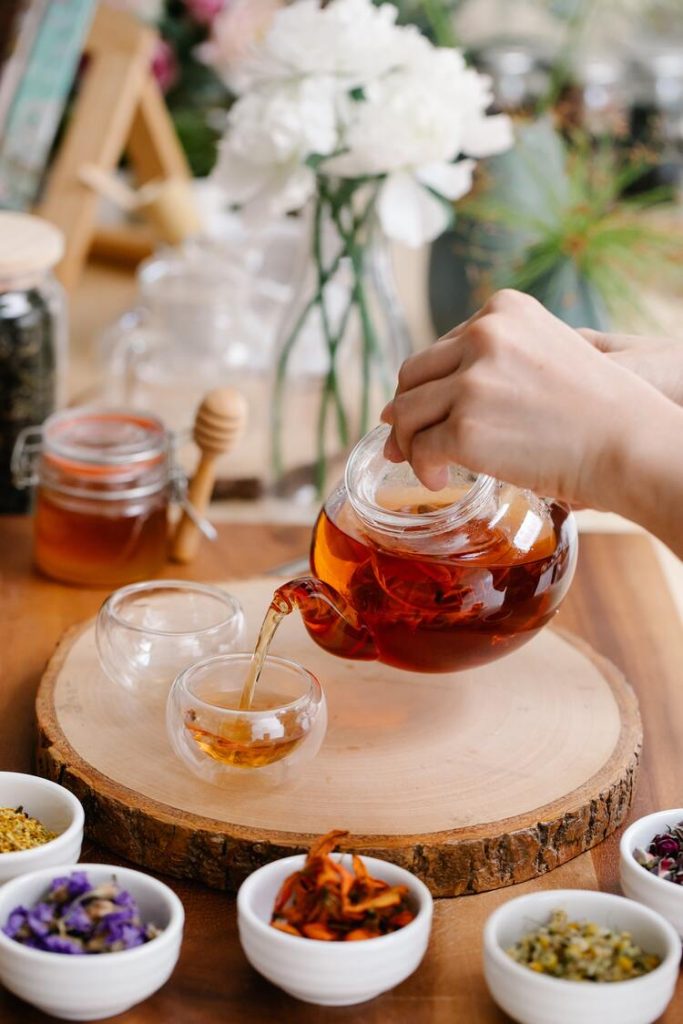
I have enjoyed writing this article. I hope you have gained new insights into the different types of herbal teas.
How many types of herbal teas were you aware of or have tried?